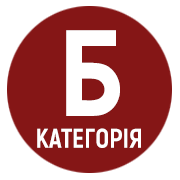EVALUATION OF EDUCATIONAL ACHIEVEMENTS OF STUDENTS WITH SPECIAL EDUCATIONAL NEEDS
DOI:
https://doi.org/10.32782/2410-2075-2024-18.9Keywords:
evaluation of educational achievements, students with special educational needs, methods of evaluation of educational achievementsAbstract
Introduction. The article highlights the issue of evaluating educational achievements of students with special educational needs. Innovative methods of evaluating educational achievements of students with special educational needs are outlined. The purpose of our research is to reveal the peculiarities and some differences in the assessment of students with special educational needs in the conditions of inclusive education. Methods. To achieve the purpose, a set of complementary methods: theoretical – analysis of normative documents, psychological and pedagogical literature and educational materials; synthesis, abstraction, generalization, forecasting, design, modelling; empirical – interviews, questionnaires, surveys, tests. Results. It was determined that the individual assessment itself is directly related to real information about the achieved educational results in the inclusive class, it provides information about the effectiveness of the work of the teacher, the team of specialists who are involved in the inclusive process at school. The use of portfolios and tests as effective methods of evaluating children with SEN is substantiated. These methods can be a tool for adequate pedagogical assessment and a means of self-assessment of the student, help the student independently apply evaluation criteria, analyze the reasons for failure and understand the conditions for achieving success. Originality. Assessment with the help of portfolios and tests stimulates the improvement of the efficiency of the educational process for all its participants Conclusions. Therefore, in the process of teaching a child with SEN in an inclusive class, the teacher should use different methods of evaluating educational achievements, choosing them depending on the individual characteristics and educational capabilities of students, topics, content, which will allow overcoming subjectivism and formalism in checking and evaluating knowledge and acquired competencies. We see the prospects for further research in the search for new, alternative methods of assessing students with SEN in the conditions of inclusive education.
References
Лорман Т., Деппелер Дж., Харві Д. Інклюзивна освіта. Підтримка розмаїття у класі : практичний посібник / пер. з англ. Київ : СПД-ФО Парашин І.С., 2010. 296 с.
Колупаєва А., Таранченко О. Інклюзивна освіта: від основ до практики : монографія. Київ : АТОПОЛ, 2016. 152 с.
Критерії оцінювання навчальних досягнень учнів початкових класів з порушеннями інтелектуального розвитку : навчально-методичний посібник / авт. : О.В. Чеботарьова, С.В. Трикоз, Г.О. Блеч та інші. Київ : ІСПП імені Миколи Ярмаченка НАПН України, 2020. 90 с.
Лапін А., Сурмай Л., Щуцька О. Інклюзивне навчання в Новій українській школі. Матеріали Міжнарод. наук.-практ. конф. (Теребовля, 26–27 березня 2018 р.). Київ : Інтерсервіс, 2018. 230 с.
Малишевська І. Зарубіжний досвід інклюзивних тенденцій в освіті. Вісник Черкаського університету. Серія «Педагогічні науки». Черкаси, 2016. Вип. 10. С. 102–107.
Основи інклюзивної освіти : навчально-методичний посібник / за заг. ред. А.А. Колупаєвої. Київ : А. С. К., 2012. 308 с.
Сак Т.В. Технологія портфоліо в інклюзивному класі. Дефектологія. 2009. № 4. С. 6–10.







